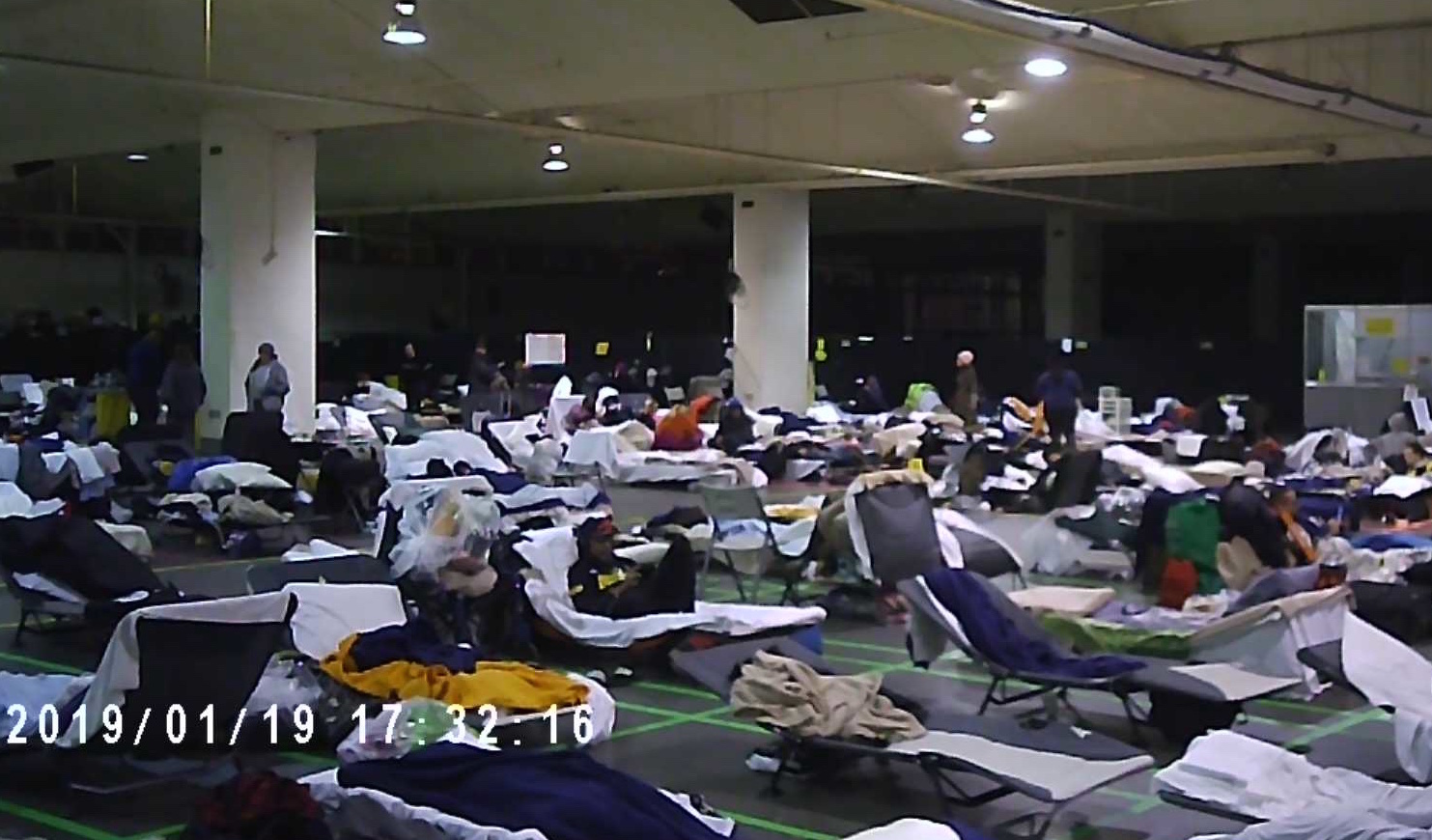Graphic secret video footage released this week showed Toronto shelter conditions that are inhumane and clearly violate international human rights.
In 1998 the Toronto Disaster Relief Committee declared homelessness a national disaster. Toronto City Council and municipalities across the country made the same statement.
We won a federal homelessness program but not a national housing program. Despite the federal Liberal government’s promises of a National Housing Strategy, homelessness has worsened in nearly every community across the country. It remains a disaster and Toronto is the epicentre. There is not one crane hovering over Toronto’s skyline that is there for social housing.
- Close to 7,000 men, women and children remain in emergency shelters.
- Roughly 1,000 people are forced to sleep year-round in a second tier of shelter including the now 33-year-old volunteer and faith-based Out of the Cold program, overnight drop-ins for women and the ironically named “respite” centres.
- The city is now relying on disaster relief structures as respite centres.
- The city issues eviction notices to people who are visibly squatting outside in parks or under the Gardiner Expressway.
- Deaths mount with four violent deaths recorded by the third week of January.
- 181,000 people are on Toronto’s Centralized Waiting List for social housing. The wait list is at minimum 12 years for a one-bedroom. Another 14,000 people await supportive housing.
- Renovictions rise as landlords take advantage of a 1.1 per cent rental vacancy rate.
In December an array of groups formed the Shelter and Housing Justice Network. Operating under the mantra of “Shelter rights, housing rights, human rights” the collective’s number 1 demand is that the City declare a state of emergency as it relates to the homelessness crisis in the city.
Toronto City Councillors Kristyn Wong-Tam and Gord Perks, both who have strong backgrounds in social justice, support community advocates call for homelessness and the housing crisis to be declared a state of emergency.
From their motion that will go to City Council January 30, 2019:
“We are just a few weeks into 2019, and already four Toronto residents, who experienced homelessness, have lost their lives on our streets. A homeless Indigenous man died in an alley. Crystal Papineau died trapped in a clothing donation bin; she was also homeless. Hang Vo was crushed by a garbage truck, as she lay sleeping in a laneway. She was 58 years old and homeless. Another young homeless woman died of an overdose in a 24-hour respite facility.”
The Province of Ontario Emergency Response Plan defines an emergency as “… a situation, or impending situation that constitutes a danger of major proportions that could result in serious harm to persons or substantial damage to property or other health risk”. It goes on to say that “These situations could threaten public safety, public health, the environment, property, critical infrastructure and economic stability.” It is clear to us that Toronto’s situation meets several of these criteria.
The Government of Canada’s Emergency Management Act states “A government institution may not respond to a provincial emergency unless the government of the province requests assistance or there is an agreement with the province that requires or permits the assistance.”
It is imperative that we, as a Municipal government, declare that homelessness is a humanitarian crisis, which we do not possess the resources to manage alone in Toronto. We must call on the Provincial government to assist us. The Ministry of Community Safety and Correctional Services is tasked with this response, under the Emergency Response and Civil Protection Act. Should the Province also find itself without the resources to adequately contain the crisis, a Provincial Emergency should be declared so that the resources of the Federal Government may be brought to bear.
Recommendations:
1. City Council affirm its commitment to complying with its obligations under International Human Rights Law to take all appropriate measures to address homelessness as a human rights crisis.
2. City Council declare homelessness a human rights disaster akin to a Municipal Emergency or a national emergency and an urgent human rights crisis, and seek assistance from the Province under the Emergency Response and Civil Protection Act.
3. City Council request the Provincial government to apply to the Federal Ministry of Public Safety and Emergency Preparedness, and alert the Minister of Families, Children and Social Development and his Parliamentary Secretary, to seek the establishment of an intergovernmental table with participation of those affected and their representatives tasked with addressing the housing and homelessness crisis in Toronto, and in any other similarly affected municipalities throughout Ontario.
4. City Council convene an emergency meeting with representatives of the federal government including the Minister of Families, Children and Social Development, the Parliamentary Secretary to the Minister, the Provincial Minister of Municipal Affairs and Housing, and persons who are homeless and precariously housed in Toronto and their representatives to develop an urgent plan of action.
5. City Council request the Office of Emergency Management take immediate steps to augment services for homeless individuals and seek the support of the Red Cross in managing the harm inflicted by the housing and homelessness crisis.”
Toronto Mayor John Tory has refused the community’s calls to declare a state of emergency in the past and he hasn’t budged this year either.
Watch for news on the city council vote January 30. If you’re in Toronto please help us fill council chambers. Please sign this petition.
In addition Councillor Wong-Tam’s petition will be presented to council.
Cathy Crowe is a street nurse, author and filmmaker who works nationally and locally on health and social justice issues. She has fostered numerous coalitions and advocacy initiatives that have achieved significant public policy victories. Her website is www.cathycrowe.ca. Follow her on Twitter @cathyacrowe.
Photo provided by Cathy Crowe
Help make rabble sustainable. Please consider supporting our work with a monthly donation. Support rabble.ca today for as little as $1 per month!




